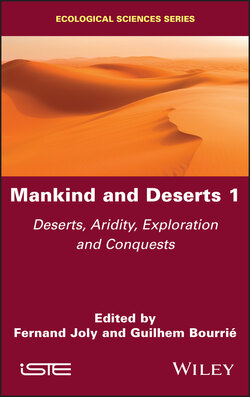Читать книгу Mankind and Deserts 1 - Группа авторов - Страница 8
1.1. All about a word
ОглавлениеDesert is one of those familiar yet ambiguous words whose meaning changes depending on people, time and place. It is one of those words whose various meanings can change the very image one has of reality. The personality of the desert is as difficult to capture in everyday language as in the imagination or in scientific research.
The object and the idea, as well as the words to talk about them, exist in humanity’s oldest texts: Babylonian, Egyptian, Hebrew, Chinese etc. In Latinate languages, the word can be traced back to 11th Century Latin. The word first described the result (desertus: deserted, abandoned) of an act of separation (deserere: to desert, to leave). A little later, the word was used to denote a place (desertum: desert), an empty or emptied site, uninhabited or depopulated. The various forms this word has taken over the years reflect this ambiguity.
In Medieval times, hermits would retire to the desert. The term, in this context, denoted both the isolation from other people as well as the barrenness of the place, the solitude and mysticism of the situation. In the 17th Century, “deserts” chiefly evoked the idea of chosen spots that were distant and discreet, where one could “flee into a desert from the approach of humans”. It was a place that was cut off from the world, voluntarily so, as was the case at the Port-Royal-des-Champs convent1, or as a result of circumstances, as in the case of the Camisards, French Protestants who lived in an isolated region of France. This connotation of abandonment or exile persists to this day. For example, we say about someone whose words go unheeded that “he is the voice crying in the wilderness” (Isaiah 40:3) and Charles de Gaulle was abandoned politically between 1946 and 1958 in a period that came to be called his “crossing through the desert.”2 From the 18th Century onwards, however, it is the geographic sense of the word that prevails. A desert is a seemingly lifeless region, uninhabited, uncultivated, arid (from the Latin arere, to burn, to dry) and sterile due to its dryness. The 19th and 20th Centuries, in turn, saw the rise of new forms of deserts: economic and demographic deserts due to rural flight toward industrial and urban areas. Finally, “desert” is used in a psychological sense to talk about an internal state resulting from a sense of deprivation of the heart or mind.
